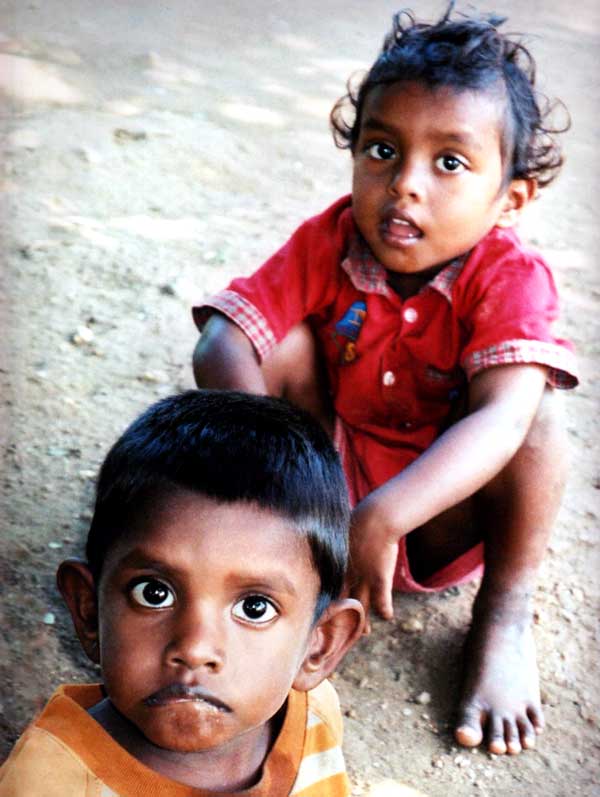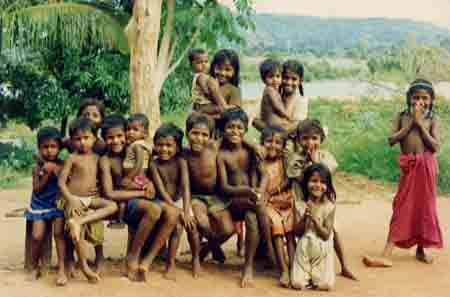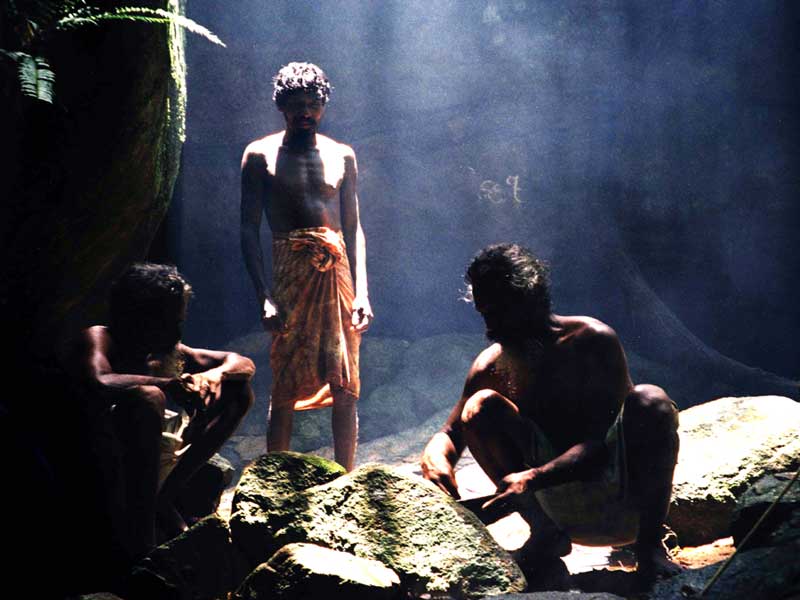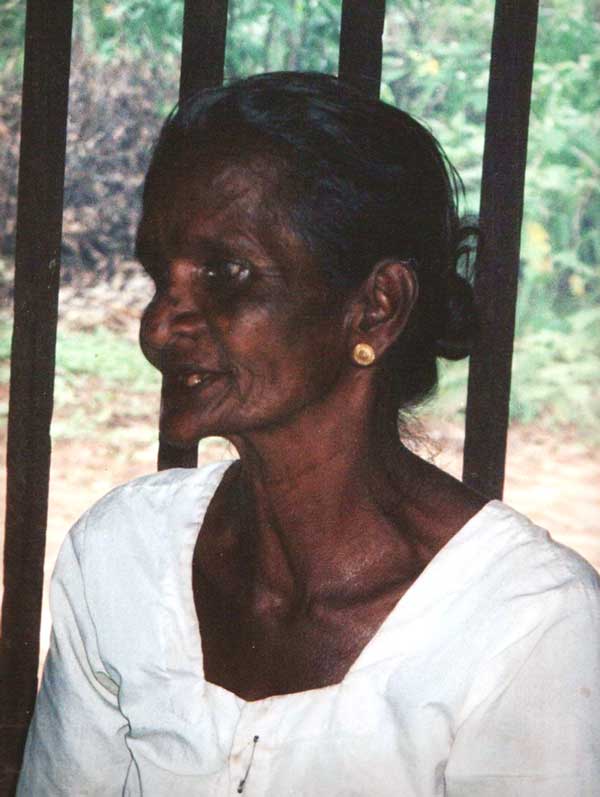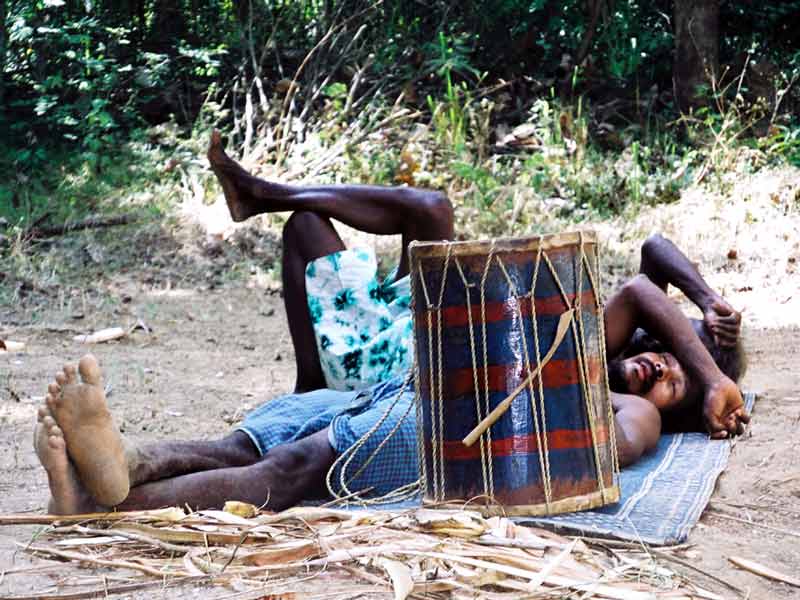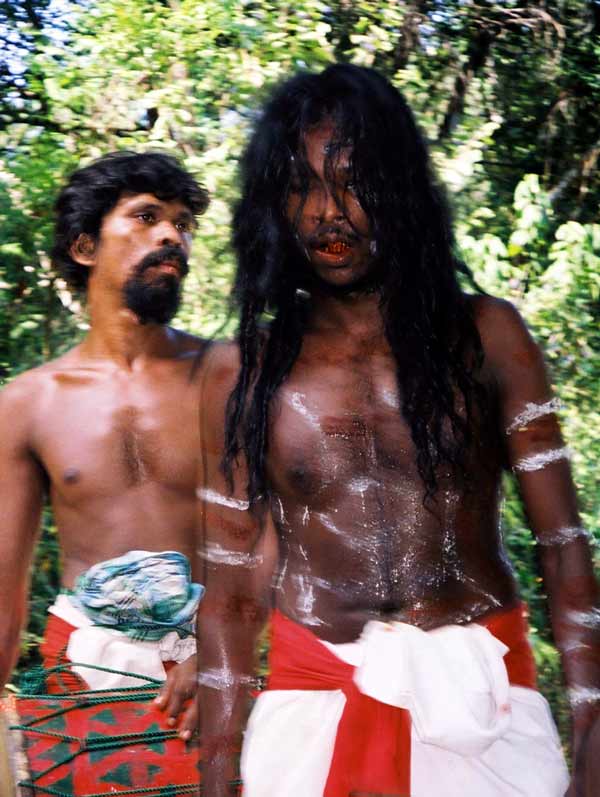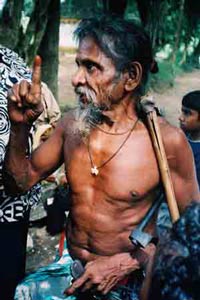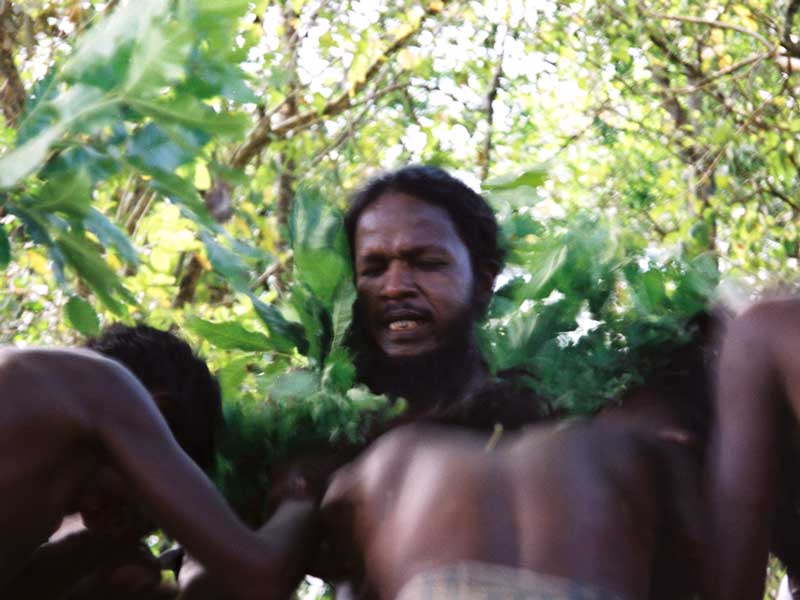veddhas – Sri Lanka
Seit Jahren pflegt Florian Palzinsky einen sehr engen Kontakt mit den veddhas den Ureinwohnern von Sri Lanka, insbesondere mit ihrem Häuptling Wanniyala Aetto. Die Zeiten als Jäger und Sammler überleben zu können sind vorbei und dadurch ist auch ihre einzigartige Kultur, Sprache und Tradition in Bedrohung.
Problems and Projects:
Q: What are the biggest problems of your people?
Vanniyala Etho: The new generation are losing interest in their own tradition, culture and language; the hunting is out of control and they are burning down the jungle [for cultivation, for cattle, because of hunting, etc]. I am putting down rules for my people. Even they do not follow them, it is the best that I can do. [Also his own behaviour is a living example for his people.]
Q: You mentioned that the big amount of people who are visiting are sometimes a problem for you. Do you have plans to solve this problem?
VE: I appreciate visits like these [poining at me], but many visitors just come to look around without any serious interest, and that really bothers me. In future, we are planning to make a barrier and ask people first to fill out some questions about their reason for coming here, etc. and to give them some understanding about basic rules of conduct, like no shouting, loud music, littering, drinking alcohol or disrespect. [I observed visitors, who entered his hut, not even taking off their shoes.]
Q: Why was the kindergarten-project at first a failure? [After working for some months it was closed down, but then reopended again]?
VE: Sometimes my people are very passive and I am not happy about that. I myself and Gunawardana were the ones who had built the kindergarten-hall with our own hands, but then the parents became disinterested. Also other NGOs supported that project, but in the end it was a failure.
I can give another example about the passivity of my people: in a few days [August 9th 2002] there is a meeting with the government in Colombo to discuss problems we are facing. I requested some of my people to come with me as representatives and what they asked was, how much they would get payed for it. [While talking like this he is smiling about it and does not make a desperate impression. . . . . – they went to Colombo, but none of the higher authorities showed interest in listening to their problems]
VE: It would be excellent if we could co-operate [as I had suggested] to make a small booklet for the young Veddha-generation about our own tradition and background. A similar project I discussed with some authorities in Colombo, but that is a slow process. Therefore I would appreciate your co-operation on the matter. I saw [during an international meeting of native people in Nepal] that they are doing something very similar.
Q: Do you still get invitations for international native people conferences?
VE: Yes sometimes, but they only send the invitation without any tickets [and of course he can’t afford that].
Gunawardana (see below): I have been at some of these meetings [Australia, Philippines]. On the one side I have the feeling that talking is going on, but nothing is coming out. On the other hand we native people would appreciate much more a natural environment than fancy hotels for such meetings.
Q: What kind of connection did you feel with the other native people?
Gunawardana: It was not so much on the verbal, but more on the mental plane [smilingly pointing to his head]. The bodies of the Australians seemed similar but bigger. The way they were chewing beetle nuts is very similar to ours. The drum beat of the native Philippenes was the same as ours.
Q: Are you proud to be a Veddha?
Gunawardana: Yes, of course. The civilised and educated people are those who destroy the world. We are proud that we are not participating in that. [Seeing how the jungle is being burnt down around Dambana, I would not completely agree with that statement.]
Q: Does any national or international organisation support you?
VE: Besides some support from the „Temple of the Tooth“-Trust [and „Simple Wisdom“] there is actually not much support from anybody; mostly just empty promises. If someone helps it is mostly for showing off and announcing their name. This is why I am tired of asking for help.
I am planing to find a „Vanniyala Etho Fund“ with the idea to help the individuals and families who are in difficulties. With that money we can, for example, bail out a man arrested for hunting [which is illegal]. That would save maybe the illegal shooting of another 10 animals, to get the money for the courts [which costs 10.000 Rs]. About every three months one Veddha gets caught because of illegal hunting. [Several encounters with Veddha-hunters and their self-made guns show that this is not uncommon.]
Beliefs:
Q: What is your religion?
VE: I do not call it really religion, but there is a close connection with the spirit of our ancestors, who lived in trees such as that Bodhi Tree over there [about 200 meters from his hut]. That connection I also have with my own father. If I am sick or if I want to be sure to be in another way successful, I get in touch with them and surely it will work out.
Una Kiri Galle [the name of a mountain in that area which means „warm-milk-mountain“] is also a place the spirits of our anciestors are living and in the night one can sometime hear their sounds. The last time that happened to me was few months back when collecting the honey for the Kandyan Perehera [the most important annual religious festival, where the Veddhas are offering honey to the tooth-relict of the Buddha]. When I was young I was scared about that, but not anymore.
Q: What about Buddhism and why do you have a Buddha Statue near the Bodhi Tree?
VE: We are not Buddhists, but we have respect towards the Buddha, because he visited this area 2500 years ago and solved some problems among our people. [There is the traditional belief that Buddha had visited Sri Lanka several times. On one occasion it was Mahiyangana, a town 15 km from the village where most of the Veddhas are living today.]
Besides that respect there is actually not much use for the statue here [one can see that it is neglected and no offerings are being made], but the Buddhists would not like it if we threw it away; and we still we have respect for it..
Gunapala: There are three mountains around this area, where one devil and two female devils are living. At certain times we do prayers and give offerings to them.
During our main annual religious festival, called Thoilaya, we dance, chant and pray to our past anciestors and spirits to keep them happy all year, so that they protect us and don’t cause sickness and problems for us. At that time sometimes close relatives who passed away, will enter the body of one person and gives advice, tells the future and requests some offerings. [For example if a male spirit is entering a female body „she“ will talk like a man.]
Gunawardana: I, personally, feel no connection with the spirit of my anciestors. The Buddhist influence during my education made a stronger impression on my mind than the traditional belief. I also go sometimes on retreat for meditation.
Q: Last night I dreamt about you. What is your understanding of dreams?
VE: If in that dream there was a good mood, something positive will happen. Usually we dream about friends or people close to us and about happenings which will take place in the future. If I dream about my father being in a happy mood, this is a good sign.
Life and Tradition:
Q: Are you still going off alone to the jungle?
VE: Yes, if things or visitors are getting too much for me or if I need to collect medicine, I go off to the jungle . . . once a month or every two months for several days.
Q: Can you survive there without any problems?
VE: Any Veddha knows how to survive and what to eat in the jungle. The last time I went off one month ago, the only problem were the mosquitoes; but I burned some elephant dung and the smoke chased them away.
A younger Veddha: We can live for two or three days in the jungle without food; but what we need to eat is beetle-nut [Most of the Veddhas chew that in big amounts throughout the day. I suppose it is addictive, but it also keeps away the hunger and gives energy.]
Q: How do you obtain knowledge about the jungle?
VE: Through tradition and experience. I’ll give you an example: my father told me not to eat a certain plant, which I never did; but my children tasted it and they realised, it can actually be eaten.
Q: Was your father wrong about that?
VE: [Smiling] There are enough things to learn from my children. [The way he answers is very interesting by poinitng out the positive and leaving aside the negative. By the way: he has seven sons and one daughter.]
Q: I heard that your people used not to count the years of their age. How do you know that your father got 110 years old?
VE: They found out through analysing parts of his upper spine [a scientific way of finding out a human’s age]. There is no use of counting your years, because you only will get sad by getting older. I, for example still think like a boy. But there is also a story of a Veddha, who married a much older woman. When she showed signs of old age he thought that he must be old too, and from that moment he became old.
Q: Why do you think that your father lived for so long?
VE: Because his life was one in harmony with a health environment.
Q: Do you think your life is more difficult than his used to be?
VE: For sure it is more difficult in modern times, but nevertheless I feel happy about myself.
Q: Do you see yourself as something like a medicine man? [At his place there are many different kinds of self made medicine in bottles or other containers, also to be sold to visitors]
VE: Every Veddha knows the first aid part of our medicine, but the deeper knowledge I learnt from my father which I am passing on to my eldest son.
Q: If you are sick, do you use your own medicine or do you go to a doctor? [After our long trip through the wilderness his foot had a cut which got infected and he put some of his self-made oil on it. Next day I noticed a great improvement with his foot.]
VE: Sometimes if a doctor is sick he needs another doctor. If I can’t cure myself I am going to someone else. [Vanniyala Etho initiated a government hospital in Dambana some years ago. I got the feeling that most of the villagers prefer to go to hospital than to use traditional medicine.]
Q: I suppose you do not eat meat to such an extent as the Veddhas used to do.
VE: Food is not a big issue for us: we eat to live and do not live to eat. When I visited Switzerland [to a native people conference in Geneva], I had no problem eating the food there. Here we eat mostly the Singhalese way: rice and curry, although for many years my stomach has been unable to handle spicy food..
Q: Do your children go to school?
VE: They do, but when they come home they just throw the books in one corner and are interested in other things.
Q: Can you speak the Sinhalese language?
VE: Yes, I can understand and could speak, but if I, as the chief, would not speak my own language soon nobody would speak it. Out of the more than 100 families living in Dambana only about 50 are left who care about their language and tradition.
Talks with two other Veddhas:
Q: Where did the Veddhas live before the settled down in Dambana and how did they survive?
Gunapala: They used to live in the forest, some distance from here. The way of surviving was based on hunting animals, like deer, wild boars, porcupines, Iguwanas, ant-eater, [but also on plants of the forest and wild honey, which seems to be the their main cash-crop, beside milk and handicrafts.] My father still went hunting, but I never did. I was born in 1954 in the jungle. I know the year, because it was registered in the school. [He doesn’t know how to read and write, but at home they speak Singhalese] As a protection again sun and rain the Veddhas used to build very simple small huts out of bark or stayed in caves [like the one I have used sometimes]. Three or four families were living together. We were 12 brothers and sisters, but two of them died when they were young. The Veddhas get married when they are about 15 or 16 years old. There are no initiation-rituals [common to native people in other parts of the world] for boys when they are coming into puberty. But there is a small celebration when a girl is becoming a woman [through getting her first period]. Elderly women are giving that girl a special bath, using a new pot and selected herbs and flowers. Neighbours and relations are invited and special food is offered.
Q: Did the Veddhas in former times used any drugs, similar to coffee, nicotin or ganja?
A: Nothing like that, but instead of beetle nut they used to take a certain bark, some kind of nut and [instead of lime] the shell of snails.
Q: Why don’t you let your hair and beard grow [common for the tradition Veddhas]?
Gunapala: While working sweat and dirt gets in your hair, causing wounds on the skin. In former times husband and wife had a similar hair style and they bound each others hair.
Q: What is your next goal in life?
Gunapala: I have a piece of land where there is water throughout the year. I would like to grow vegetables there, because I could sell them in my shop. [Later we bought him the necessary tools]. There I have also paddy fields, which would provide me with enough rice for my family throughout the year, but half of it I have to give for those who are helping with the cultivation.
Q: What kind of job do your children want to have in future?
Gunapala: My two eldest daughters have already a family [If I am able to provide them with a sewing machine they would start a small tailor-business], but the two next ones, 12 and 15 years old, want to become a teacher and a nurse.
Q: Recently you went to Kandy, did you like that city?
Gunapala: I did not like it at all, the noise is too much.
Gunawardana is the only Veddha who studied at the University of Colombo and holds a B.A.. He wrote two books about his people ; one of them is translated into English: „Hunting Grounds“. Presently he is a teacher in another Veddha village nearby.
Q: How old are you and is it common not to be married?
Gunawardana: I am 35 and it is unusual for Veddhas not to marry. I feel that if you have family, you lose your freedom and find worries, which never end. As soon as your children are grown up, the next generation starts [Veddhas life in big families where it is natural that the older people take care for the young ones].
Q: You studied Singhalese as a subject. Is there any connection to the Veddha-language?
Gunawardana: Parts of our language must have been lost in the past and one can’t speak it without using the Singhalese words.
Q: As a student you stayed in Colombo. How did you like the life in the city and did you choose to come back to Dambana?
Gunawardana: I did not like the city. There are a lot of people, but no friends, therefore I decided to come back to my people.
SPENDENKONTO:
„Simple Wisdom – Sri Lanka“
Konto Nr.: 323.352
Bank: Raiffeisenbank – Mondseeland
BLZ: 34322
IBAN: AT253432200000323352
SWIFT: RZOOAT2L322
Ein Staudammprojekt wurde umgesetzt, um dadurch Gemüseanbau in der Trockenzeit zu ermöglichen. Ein Veddha-Lehrbuch wurde für ihre Kinder gedruckt. In Zusammenarbeit mit Gunawardana, dem einzigen Veddha, der an der Universität studiert hat, wird an einem Wörterbuch der Veddhasprache gearbeitet. Außerdem wurden und werden u.a. Hausbau und Renovierungsarbeiten, Landwirtschaftsgeräte, Schulsachen, Ritualveranstaltungen, finanziert.
Zwei Betreuerinnen des Kindergartens werden monatlich bezahlt. Für das fertiggestellte Dammprojekt sind weitere Wasserkanäle geplant, um möglichst effektiv die Bewässerung zu nutzen.
Der Hausbau von Gunapala (am kindergarten-foto auch abgebildet) soll möglichst bald fertiggestellt werden, da seine jetzige hütte nicht monsun-fest ist, und damit es nicht mehr bei seiner Hütte hinein regnet.
Das bereits zusammengestellte Wörterbuch der veddha-Sprache wird im Herbst in Zusammenarbeit mit einer österreichischen Schulklasse editiert und dann in Print gegeben.
WEITERE PROJEKTPLÄNE
-
Unterstützung von weiteren Camps mit Kriegsflüchtlingen durch lebensnotwendigen Lebensmitteln und Haushaltsartikeln.
-
Stipendien und Gehälter von Schülern, Studenten, Kindergärtnerinnen und Lehrern.
-
Dorfprojekte im Osten und Zentralland
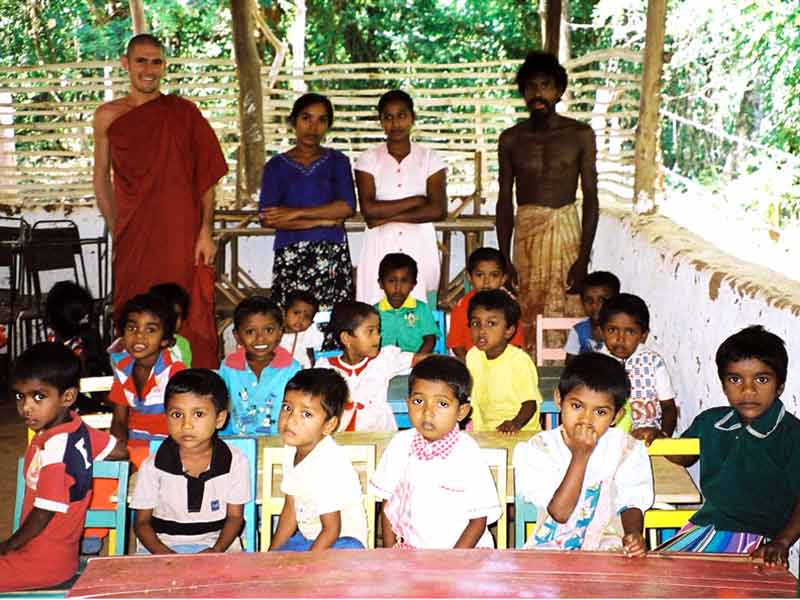
Comments are closed.
